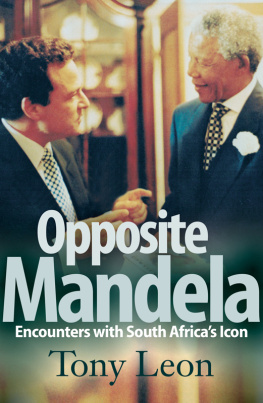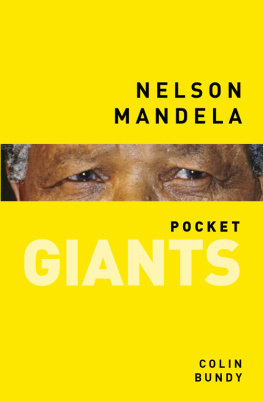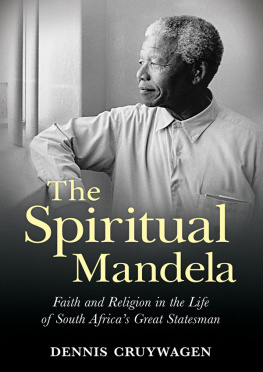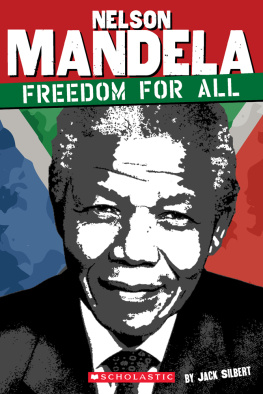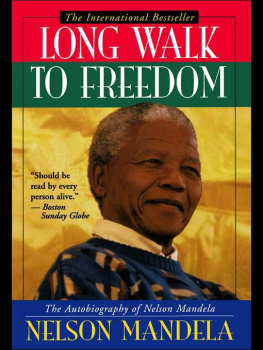
Tony Leon has written a book of unique insight into an unexplored aspect of the presidency and leadership of Nelson Mandela. Opposite Mandela tells the untold stories of how South Africas first democratic president related to his political opponents.
Leon served as leader of the Democratic Party during Mandelas presidency. Although they clashed, sometimes fiercely, on great issues of the day, Leon enjoyed an unusually warm relationship with Mandela and had direct access to the presidents office.
In this first-hand account, he relates some of the more consequential events in those momentous times in South Africas history-in-the-making through the lens of the opposition. Although this is a personal account, it also explores some of the major themes from reconciliation to corruption that not only marked that period but also laid the foundation for the challenges confronting South Africa today, nearly two decades after Mandela assumed the countrys highest office, the very moment when Leons political leadership began.
Insightful, and simultaneously serious and amusing, it lifts the veil on many unknown or unexplained benchmarks from that era: the personal animosity between Mandela and FW de Klerk, the decision of the Democratic Party to reject Mandelas offer of a seat in his cabinet and whether the extraordinary outreach of Mandela to the minorities was the shrewd calculation of a latter-day Machiavelli or the genuine impulses of a secular political saint. This highly readable account considers in a balanced manner both the golden moments and the blind spots of one of the most important presidencies and leaders of the modern democratic age.
In the confiding, winningly self-deprecatory style that defines Leons authorial voice, he offers us a unique personal insight into Nelson Mandela and guides us, engagingly and provocatively, through the most turbulent and exciting times in contemporary South African politics. John Carlin, author of Playing the Enemy and Knowing Mandela
A frank, fair-minded memoir of the Mandela years by a political opponent whom Mandela himself clearly liked and respected. JM Coetzee
He is a leader whose dynamism and capacity for analysis keeps everyone on their toes. Nelson Mandela on Tony Leon
Tony Leon served for twenty years (19892009) as a member of parliament in South Africa and for thirteen years as leader of the Democratic Party and Democratic Alliance, the countrys official opposition party. His party leadership commenced in May 1994, within days of Nelson Mandelas inauguration as president. Leon also played a key role in the constitutional negotiations that led to the birth of a democratic South Africa. A lawyer and attorney, he lectured in Constitutional Law at the University of the Witwatersrand, Johannesburg, and served on the Johannesburg City Council before entering parliament.
After standing down from party leadership in 2007, he was awarded a Fellowship to the Institute of Politics, John F Kennedy School of Government, Harvard University, and in 2008 was Visiting Fellow, Cato Institute, Washington DC. In 2009, President Jacob Zuma appointed him as South African ambassador to Argentina, Uruguay and Paraguay, where he served as Head of Mission in Buenos Aires until October 2012. Following his return to South Africa, he became executive chairman of Resolve Communications (Pty) Ltd, a weekly columnist for Business Day newspaper and a consultant to business in South Africa and overseas. He also lectures both locally and abroad.
He has published three previous books Hope & Fear Reflections of a Democrat ; On the Contrary Leading the Opposition in a Democratic South Africa , winner of the 2008 Recht Malan Prize for non-fiction; and The Accidental Ambassador From Parliament to Patagonia . He has published widely in major media and academic journals. www.tonyleon.com
OPPOSITE MANDELA
Tony Leon
ENCOUNTERS WITH SOUTH AFRICAS ICON
JONATHAN BALL PUBLISHERS
JOHANNESBURG AND CAPE TOWN
DEDICATION
For Peter, a full participant in the period chronicled
in these pages, and for Noa and Etai, and the next generation,
who will live in freedom because of its legacy
ACKNOWLEDGEMENTS
I am grateful to Jonathan Ball the founding and moving spirit of Jonathan Ball Publishers, for conceiving this book and enthusing on its progress from idea to manuscript. Jeremy Boraine, Publishing Director, provided both a professional eye and expert follow-up through to production and then publication. Michael Morris was a careful, thoughtful and efficient editor, whose deft touch and assistance with research improved the text. Lesley Hay-Whitton did the final edits with equal measures of keen-eyed excellence and good humour. My profound thanks to Jan-Jan Joubert, one of the countrys best political journalists, for volunteering to do the final fact-checking with his customary diligence. The design was undertaken by Michiel Botha (cover) and Kevin Shenton of Triple M Design, and the picture research by Rhianne van der Linde.
Irritatingly, all the mistakes that might appear remain my own.
TONY LEON
CAPE TOWN JANUARY 2014
It was not the Roman army which conquered Gaul, but Caesar;
it was not the Carthaginian army which caused the Republican army
to tremble at the gates of Rome, but Hannibal;
it was not the Macedonian army which reached the Indus, but Alexander.
EMPEROR NAPOLEON BONAPARTE
Introduction
J OHANNESBURGS MILPARK HOSPITAL , in the suburb of Parktown West, was an unlikely place in early December 1998 for an encounter between the president of South Africa and one of his political opponents.
Fate, a bad genetic inheritance and some dissolute habits found me in one of Milparks private wards on the eve of a quadruple coronary bypass operation. My cardiologist had assured me that any further delay in the operation would mean that my imminent forty-second birthday might well be the last I celebrated.
I had not allowed the timing of the operation to interfere with a hectic political schedule and, in the days preceding my admission to the cardiothoracic section of the hospital, had undertaken a fairly gruelling tour of South Africas major cities, featuring as the star in showbiz-style rallies in what the Democratic Party, which I had been leading since 1994, billed the Leader of the Opposition Tour. This was something of a stretch: at the time, my party had only seven seats in parliament out of 400 nearly seventy fewer than those gained in the 1994 election by the principal opposition formation and previous government, the National Party (NP).
However, my party had, in the preceding four years, made most of the running on the opposition side in parliament, and the polls and a string of by-election victories in previous National Party strongholds suggested that there would be a reversal of fortune for both the NP and my party in the next general election, due six months hence. My political strategists had decided we needed to make the claim for chief opposition status well before election day, hence the Leader of the Opposition Tour, which combined razzmatazz with chutzpah. Fortunately, the next election saw the Democratic Party eclipse the once-mighty NP and increase its very modest 1994 tally by over sixfold, confirming our brazenness.
It was during one or other of the city hall rallies a few weeks earlier that, in my usual no-holds-barred style, I had lashed out at the African National Congress cabinet led by Nelson Mandela for what I, along with my supporters, viewed as its lapses of governance. This particular attack clearly angered the president. A day or two afterwards he ridiculed my party and the increasingly hapless National Party, then languishing under a deeply unpopular leader, Marthinus van Schalkwyk, who had succeeded the consequential former president FW de Klerk in the post dismissing us both as Mickey Mouse parties. At the next rally, a newspaper reporter asked for my response to the presidents attack. Stumped for a meaningful rejoinder, I decided to repay him with a coin from the currency of Walt Disney. Well, if I lead a Mickey Mouse party, I said, then Mandela must lead a Goofy government.
Next page
